Greetings in Japan is very important and because of that, it is also very convenient to learn some useful Japanese phrases for work in Japan. These phrases show respect to your seniors and other workmates while in your workplace. In addition, this will create a good impression as a foreign worker.
In this article, learn the most commonly used phrases and words while working in Japan. We will also provide the hiragana writings, the romaji counterpart, and the English translation for learning benefits and purposes! If you can read the Japanese characters, the better.
1. おはようございます!

Romaji: Ohayou Gozaimasu
Translation : Good Morning
This greeting is commonly used to greet your workmates upon entering the workplace. This is used in the morning and practically means Good Morning. Even late, you will still say Ohayou Gozaimasu and everyone will respond Ohayou Gozaimasu in return.
Example: Lester-san, Ohayou Gozaimasu! / レスターさん、おはよう ございます!
2. こんにちわ!
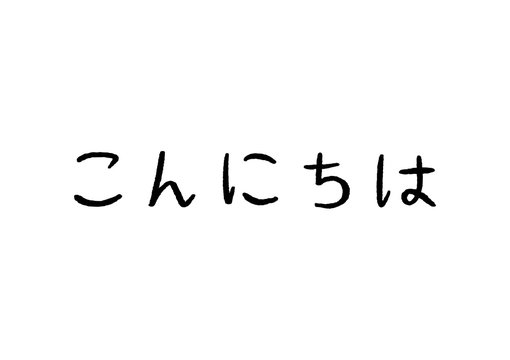
Romaji: Konnichiwa
Translation : Good Afternoon/Hello
You commonly use this greeting at noon. Or if you meet someone, you can also use this phrase. This phrase is very friendly to hear. So don’t hesitate to say this.
Example: Nesah-san, Konnichiwa! / ネサーさん、こんにちわ!
3. こんばんわ!
Romaji: Konbanwa
Translation : Good Evening
To greet someone in the evenings, use this phrase. This is one of the easiest words to learn. This is also one of the phrases you will hear everyday .
Example: Jhon-san, Konbanwa! / ジョンさん、こんばんわ!
4. よろしくおねがいします!
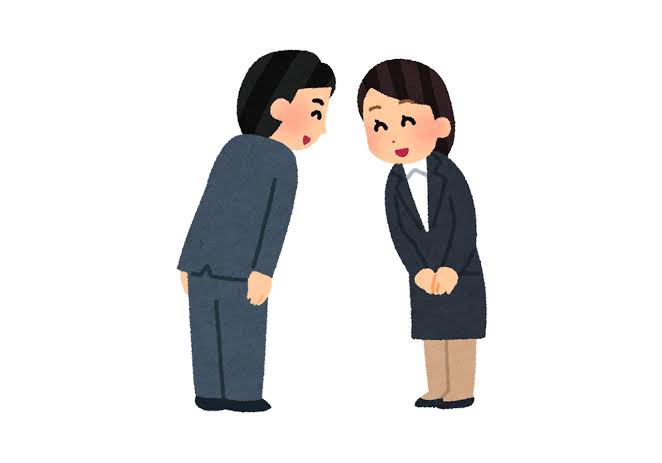
Romaji: Yoroshiku Onegaishimasu
Translation : Nice To Meet You / Best Regards! / Please Take Good Care Of Me.
This is used especially before the work starts. This is regarded as respect while in the workplace. This can also be added to greetings above.
Example: Lester-san, Ohayou Gozaimasu! Yoroshiku Onegaishimasu! / レスターさん、おはようございます。よろしくおねがいします。
5. すいません
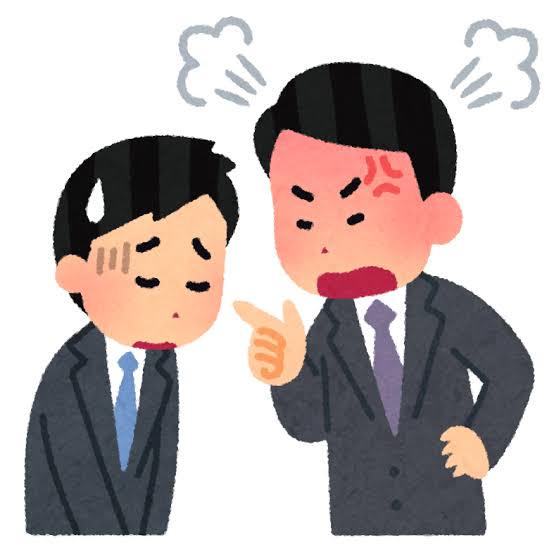
Romaji: Suimasen
Translation : Excuse Me / Sorry
Commonly used, Suimasen means excuse me or sorry. So if you want to ask something, use this phrase before stating what you want to ask. This way, the receiver will be glad to do your request.
Example: Lester-san, Suimasen. Kore dou sureba ii desuka? / レスターさん、すいません。これどうすればいいですか?/ Mr. Lester, Excuse me. What do I do with this?
6. おつかれさまです! / おつかれさまでした!

Romaji: Otsukaresamadesu / Otsukaresamadeshita
Translation : Well Done! / Good Job!
After finishing your work and if everyone is going home, you have to say a Good Job to everyone. In Japan, you commonly say, Otsukaresamadeshita. This means Well done too.
Example: Minnasan, Otsukaresamadeshita.! / みんなさん、おつかれさまでした! / Good Job Everyone!

Additional Useful Words and Phrases To Learn
Familiarize these words (kotoba / ことば / 言葉 ) in Japan for a good impression and better conversation. This will help you as a foreigner to be known as a respectful person. And this will make the work environment more friendly and peaceful.
For 5 best learning Japanese apps, click here.
1. To introduce yourself, say “初めまして。 私の名前は (your name) です。よろしくお願いします。”
Romaji: “Hajimemashite. Watashi no namae wa “Lester” desu. Yoroshiku Onegaishimasu.” /
Translation: ” Nice to meet you. My name is Lester. Please take good care of me. “

2. If you are going out, you say I’m going out! In Japanese, it is 行ってきます。/ いってきます / 行って参ります。/ いってまいります。
Romaji: Ittekimasu or Itte mairi masu.
Translation: I’m going out!
3. If someone is going out, you will respond 行ってらっしゃい。 いってらっしゃい。
Romaji : Itterasshai.
Translation : This means Please go and return safely.
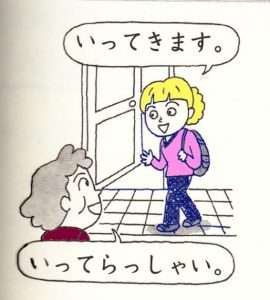
4. If you return in the workplace from outside, you will say, ただいま
Romaji: Tadaima or Tadaima Modori mashita / ただ今戻りました。 / ただいまもどりました。
Translation : This means I’m back!
5. To respond Tadaima, you say, お帰りなさい。/ おかえりなさい。
Romaji: O-kaeri-nasai.
Translation : This means Welcome back!
6. In the evening, if you are leaving first, you say, お先に失礼します / おさきにしつれいします
Romaji: O-saki-ni shitsurei shimasu.
Translation : This means sorry I will be leaving first.
7. To respond someone who is leaving first in the evening, you say, お疲れ様でした。/おつかれさまでした.
Romaji: O-tsukare-sama deshita.
Translation : This means Good work.
8. 会長 / かいちょう
Romaji: Kaicho
Translation : Chairman
9. 社長 / しゃちょう
Romaji: Shachou
Translation : President
10. 副社長 / ふくしゃちょう
Romaji: Fukushachou
Translation : Vice President
11. 部長 / ぶちょう
Romaji: Buchou
Translation : Department manager
12. 課長 / かちょう
Romaji: Kachou
Translation : Section Manager
13. 同僚 / どうりょう
Romaji: Douryou
Translation: Colleague
14. 部下 / ぶか
Romaji: Buka
Translation: Subordinate
15. 会議/ かいぎ
Romaji: Kaigi
Translation: Meeting
16. 面接 / めんせつ
Romaji: Mensetsu
Translation :Interview
17. 通勤ラッシュ / つうきんラッシュ
Romaji: Tsukinrasshu
Translation : Commuting Rush Hour
18. 会社 / かいしゃ
Romaji: Kaisha
Translation: Office/company
19. 判子 / 印鑑 / はんこ / いんかん
Romaji:Hanko / Inkan
Translation :Japanese seal
20. 名刺 / めいし
Romaji: Meishi
Translation : Business card
21. ファックス
Romaji: Fakusuo
Translation : Fax
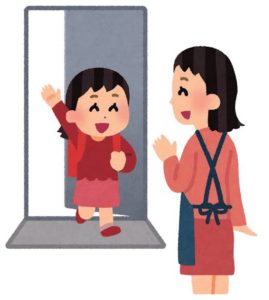
22. プリンター
Romaji: Purintaa
Translation : Printer
23. コピー機 / コピーき
Romaji: Kopiiki
Translation : Copying machine
24. 電話 / でんわ
Romaji: Denwa
Translation : Telephone
25. 書類 / しょるい
Romaji: Shorui
Translation : Document(s)

26. 保険 / ほけん
Romaji: Hoken
Translation : Insurance
27. 上司 / じょうし
Romaji: Jyoushi
Translation : Superior
28. 部下 / ぶか
Romaji: Buka
Translation : Subordinate
29. To formally thank someone for helping you, you say, お世話になっております。 / おせわになっております。
Romaji: Osewa ni natte orimasu
Translation: Thank you for your kind cooperation. I appreciate your cooperation.
30. ご苦労さまです。/ ごくろうさまです。
Romaji: Gokuro sama desu.
Translation : Thank you for your hard work, Good job . This phrase is only to be used by a superior to their subordinates.

31. ありがとうございます。
Romaji: Arigatou gozaimasu /
Translation : Thank you very much.
32. 頂きます。/ いただきます。
Romaji: Itadakimasu
Translation : Let us eat. Dig in. Workers commonly use this phrase before eating food especially in gatherings .
33. ご馳走様でした。/ごちそうさまでした。
Romaji: Gochi sou sama deshita
Translation : Thank you for the food! / That was delicious! After eating, you say this phrase to thank the one who cooked the food.
34. もうしわけ ありません。
Romaji: Moshiwake arimasen.
Translation : I am deeply sorry. This phrase is the formal form of Suimasen, Sumimasen, Gomen or Gomenasai.
35. 承知しました。しょうちしました
Romaji: Naru hodo desu ne.
Translation : I see or I understand. You usually say this when your boss tells you to do something and you understand his request.

Now that you are well-equipped on useful Japanese phrases for work in Japan, there is no doubt that you will be effectively and efficiently good at your job. These phrases are not hard to familiarize with. You will get used to it as you work in Japan for a long time.
It is also important to adapt to the culture in Japan as this will affect your life and work there. Their language is part of their culture and it runs even to your workplace. If you can speak fluently in Japanese and English, bilingual jobs are waiting for you in Japan.
 日本語
日本語









この記事へのコメントはありません。